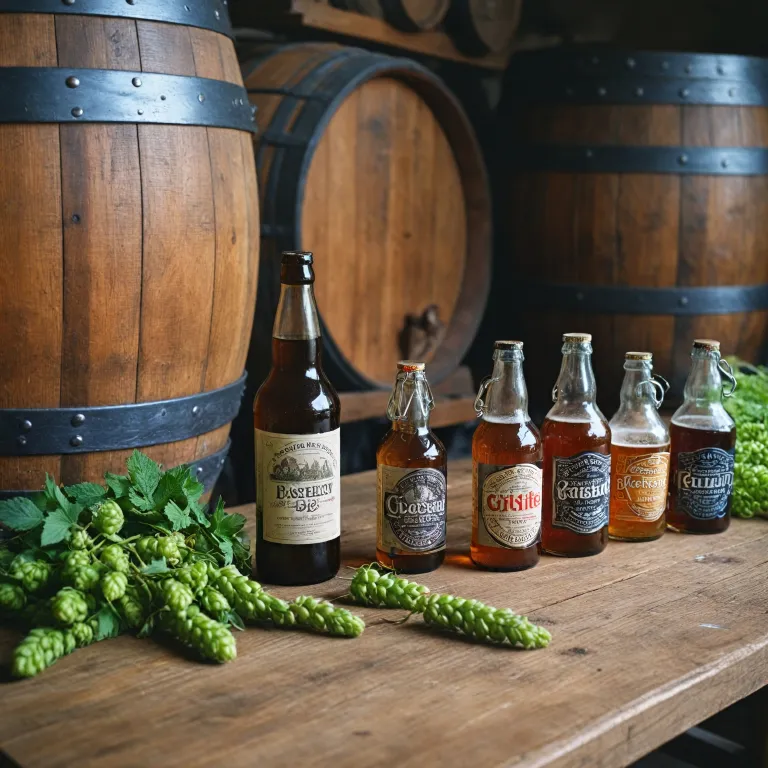A Brief History of Grisette Ale
The Origins and Legacy of Grisette Ale
Grisette ale, with its intriguing background and unique flavor profile, has carved a niche for itself among beer enthusiasts. The story of this delightful brew begins in the mining regions of Belgium and Northern France, where it was brewed as a refreshing beverage for miners. These workers, known for their grueling labor, needed a crisp, low-alcohol ale that could quench their thirst without hindrance during strenuous tasks.
Reminiscent of traditional saisons, the humble grisette shared similarities with its farmhouse cousin, yet developed its distinct character due to its brewing practices and regional variations. Its connection to the mining community is deeply rooted in its name as well. "Grisette," translating to "little gray," refers not only to the color of the stone extracted from the mines but also to the gray-clad women who served the beer. These women were affectionately called "grisettes." This interplay of history and culture adds an extra layer of charm to the ale.
As you familiarize yourself with the fascinating aspects of grisette ale, it’s interesting to compare it with other iconic ales such as
Saison Dupont. This exploration can offer a deeper understanding of the stylistic differences and subtle nuances that make each beer unique.
See offer

Brewing Process and Ingredients
From Ingredients to Tradition
Grisette ale proudly carries the essence of its historical roots through the careful selection of ingredients and brewing techniques. Traditionally brewed to quench the thirst of miners in the Belgian region, grisette retains a light and refreshing profile that distinguishes it from its rustic counterparts.
To achieve its characteristic brightness, grisette uses a combination of pilsner malt and wheat. These grains provide a smooth, slightly creamy mouthfeel, making it noticeably less bitter than what you might find in a more hop-forward style. Its gentle hop aroma comes from European varieties like Saaz and Styrian Goldings, adding a subtle herbal and floral note to the drinking experience.
Yeast's Vital Role
An essential component in shaping grisette's profile is the yeast strain used during the brewing process. Employing a clean, slightly fruity Belgian ale yeast, brewers are able to highlight the beer's refreshing qualities while retaining a complex, nuanced character. The fermentation process imparts a light, peppery spiciness which complements the herbal undertones from the hops.
A crucial part of its charm lies in the brewing traditions that remain closely tied to its origins. Much like a
flavorful journey through the Basque-inspired brew, grisette represents the region’s commitment to sessionable ales that celebrate both tradition and taste.
Modern interpretations of grisette may vary slightly, but they hold true to the spirit of creating an enjoyable beer for leisurely drinking. By understanding its roots and embracing the authentic brewing process, one can appreciate this traditional ale's understated elegance and charm.
See offer

Tasting Notes and Characteristics
Tasting the True Essence
Grisette ale is renowned for its fresh, light, and refreshing profile, making it a delightful option for any beer enthusiast seeking something slightly different. The beer is characterized by its effervescent, lively carbonation, which enhances the drinking experience and brings out the different flavors.
In terms of aroma, grisette tends to present a mild, yet inviting bouquet. You might notice a hint of citrus, complemented by herbal and floral notes. This subtlety makes it a versatile choice for various occasions, seamlessly transitioning from a casual daytime beverage to a sophisticated dinner table addition.
When it hits your palate, you're greeted with a clean malt flavor that harmonizes perfectly with a gentle touch of fruitiness. The finish is crisp, with a slight tartness that adds depth without overwhelming the senses.
A key aspect to note is the lower alcohol content, which makes grisette a sessionable beer, ideal for prolonged enjoyment without feeling too heavy. The moderate bitterness ensures it remains balanced, keeping the drinker refreshed and eager for more.
For those interested in the nuanced differences between various beer styles, understanding the difference between beer types can provide further insight into why grisette stands out in the vast landscape of ales, particularly when compared to its cousin, the saison.
See offer

Grisette vs. Saison: What's the Difference?
Comparing Grisette and Saison: Key Differences
While both grisette and saison are beloved Belgian-style ales, they have distinct characteristics that set them apart. Understanding these differences can enhance your appreciation of each style.
- Origin and Purpose: Grisette originated as a refreshing beverage for miners, whereas saison was traditionally brewed for farm workers. This difference in origin influences their flavor profiles and brewing methods.
- Alcohol Content: Typically, grisette has a lower alcohol content compared to saison. This makes grisette a lighter option, perfect for those seeking a sessionable beer.
- Flavor Profile: Grisette is known for its crisp, light, and slightly tart flavor, often with citrus notes. In contrast, saison tends to have a more complex profile with spicy, fruity, and earthy flavors.
- Yeast and Fermentation: Both styles use Belgian yeast, but the fermentation process can differ. Saisons often undergo a warmer fermentation, contributing to their unique taste.
These differences highlight the unique charm of each beer, offering a delightful experience for beer enthusiasts.
See offer

Modern Revival and Popularity
Rising Appeal and Contemporary Treatment
Grisette ale has experienced a resurgence in recent years, fueled by a growing interest in traditional brewing techniques and unique flavor profiles. Many craft breweries around the world have started to incorporate grisette into their offerings, driven by consumers’ desire for lighter, more refreshing beer options.
The modern revival of grisette ale can be attributed to several factors:
- Craft brewery experimentation: Craft brewers are continually exploring historical styles, and grisette’s approachable nature makes it an attractive choice for both traditionalists and those new to craft beer.
- Sessionability: With a lower alcohol by volume (ABV), grisette ales provide beer lovers with a sessionable choice that doesn't compromise on flavor, allowing them to enjoy multiple pints without feeling overwhelmed.
- Versatility: Grisettes are known for their versatility in pairing with various foods, making them a favorite among foodies and beer enthusiasts alike.
This revived interest has made grisette ale more accessible, allowing more consumers to appreciate its subtle yet intriguing characteristics. Its growing popularity suggests that grisette is no longer just a relic of the past but a beloved choice for modern beer aficionados as well.








